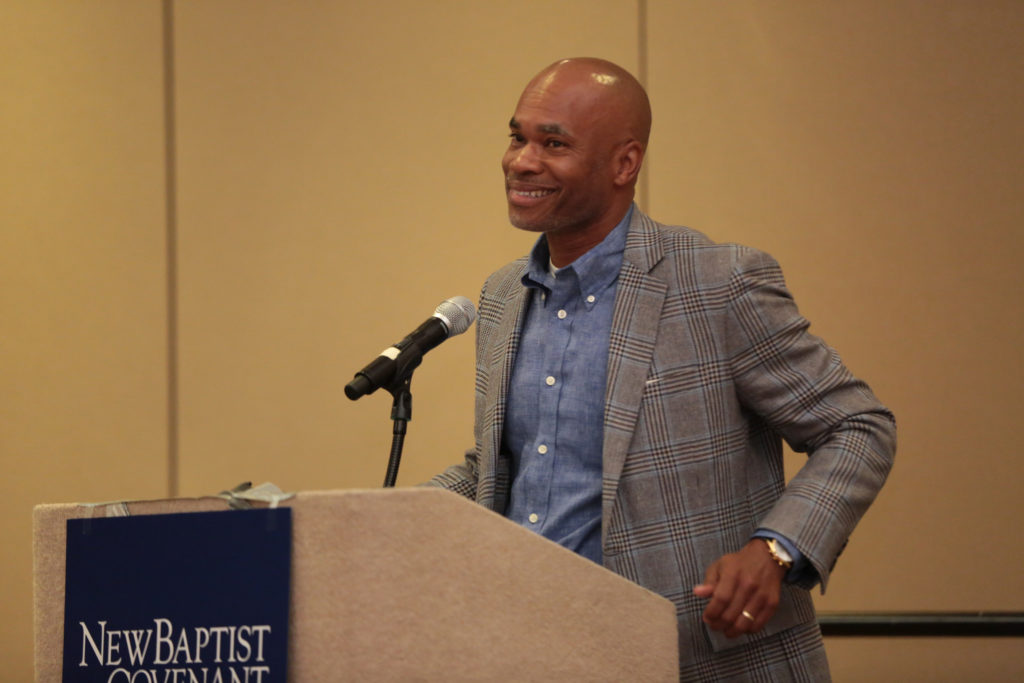An African-American minister described the experience of being black in America as a “burdensome joy” at a New Baptist Covenant luncheon June 23 during the Cooperative Baptist Fellowship General Assembly in Greensboro, N.C.
“Much of who I am and what I do is a result of being black,” said Darryl Aaron, pastor of Providence Baptist Church in Greensboro. “If I am not black, I don’t have to tell son at three years of age never to run out of a store chasing your sister. So what you’re having fun?”

Darryl Aaron (CBF photo)
“Later on, as he ages, I tell him to always get your receipt,” Aaron continued. “So what if your friends want to walk home? I must come and get you if the streetlights are on. So what if your friends walk through the yard and jump the back fence? You cannot do that, son.”
“There’s a reason I have to filter my encounter with the waitress,” he said. “Is she simply and unkind person or is she treating me this way because of the color of my skin?”
Aaron said to be black in America “is to be valued less than others.”
“When the young black boy sees Michael Brown lie animal-like in the street for four hours with multiple gunshot wounds from head to toe, he knows he is less valued than others and wonders when the day will come when he too will be shot down.”
Aaron said being black is burdensome, “because of the weight it places upon one’s selfhood.”
“But being black is also a joy,” he said, “because I know that the gospel is only for those who are burdened.”
“I’m not saying that God made me black to give me joy,” Aaron said. “I’m not saying that it is God’s plan to allow America to systematically deny blacks, ignore blacks — more blacks in prison, more black today than were jailed in the climax of South Africa’s apartheid — and simply value black persons less than other.”
“What I am purporting is being black in such adverse condition, I can see what God has brought to this world is good news.”
Aaron said being black in America has advantages when it comes to seeing “what God is up to” in interpreting the Bible.
“When I hear that the last will be first, and the first will be last, that’s not a hard text for me,” he said. “That’s good news.”
Bill Leonard, a professor at Wake Forest Baptist Divinity School who is a longtime member at Aaron’s former church, said being white in a predominantly African-American setting “taught me how to listen to Jesus differently.”
“It taught me Jesus on the margins,” Leonard said.
Leonard said the “burden of being white” involves moving “through guilt but not from guilt into memory.”
“Listening to black preachers and black preaching convinced me to the memory of how long we have spent using the Bible to undergird our racism, and how long it took us to stop using the Bible and finally apologize,” Leonard said. “What am I doing right now is wondering what my student’s children are going to have to apologize for some day.”
Aaron said the great challenge for the church “is to admit that we’re not embracing the gospel of Jesus.”
“I once had a white minister say to me in a meeting with other clergy, ‘I don’t do that prophetic ministry that Darryl does,’” he said. “My response was, ‘So what other ministry is there?’”
“The church must come to see that justice work is gospel work and gospel work is justice work,” Aaron said. “Those of us who have witnessed the grace of God must carry the burden of eradicating injustices everywhere, but there’s joy knowing that you’re doing the will of God.”
Aaron closed by declaring “that every American, every follower of Jesus must take on the burden of being black and every other burden that oppresses people.”
“Wherever there is racism, prejudice, homophobia, sexism, classism — any form of oppression — it is the joy of each believer to embrace the good news of knowing that all forms of evil is dying and it will die because of the will of God,” he said.
